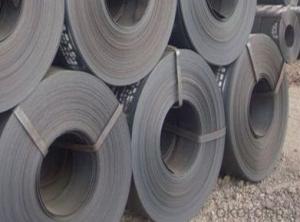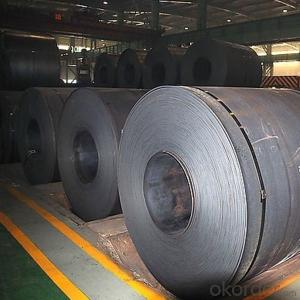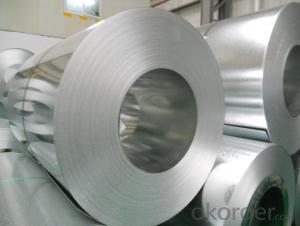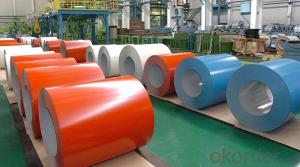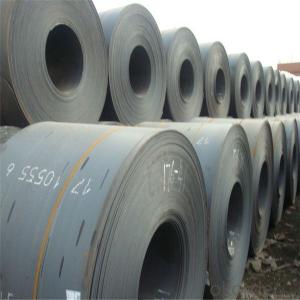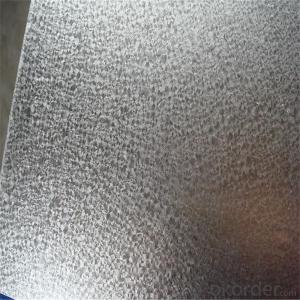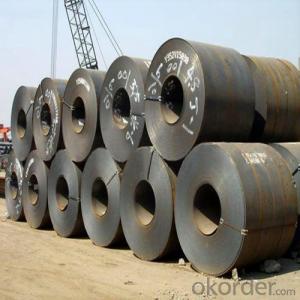Hot- Rolled Coils
- Loading Port:
- China Main Port
- Payment Terms:
- TT OR LC
- Min Order Qty:
- -
- Supply Capability:
- -
OKorder Service Pledge
Quality Product, Order Online Tracking, Timely Delivery
OKorder Financial Service
Credit Rating, Credit Services, Credit Purchasing
You Might Also Like
Quick Details
Standard:AISI, ASTM, BS, DIN, GB, JIS
Grade:SAE1006 OR SAE1008
Thickness:1.8-15MM
Model Number:SAE1006 OR SAE1008
Type:Steel Coil
Technique:Hot Rolled
Surface Treatment:bulk or spary painting
Application:welded steel tubes
Special Use:High-strength Steel Plate
Width:600mm-1500mm
Length:coil or 5.8m,6m,9m,12m.
CERTIFICATE::BV,SGS INSPECTION
SIZE::COIL CUT AS THE STEEL PLATE
Packaging & Delivery
| Packaging Details: | Standard seaworthy export packing or waterproof paper wall protection disk,galvanized metal |
|---|---|
| Delivery Detail: | 15-20days after receiving the deposit or the copy of L/C |
- Q: I own a crappy steel string acoustic and a very nice electric guitar.I have saved up to buy a new acoustic but I cannot decide to just invest in a better steel string or explore around with a nylon string. From others experience, will I get my fill of satisfaction of playing on a nylon, or should I stick to a steel string?
- Really?! I think you would be more satisfied with a harmonica. And that is because I know you better than you know yourself. But, if you like steel, go for a 12-string.
- Q: Myself, iam Working In a Steel Fabrication Company. I completed my Engineering in 2006 and immediately recruited in this company in Oman. My company is Steel Fabrication company .So as i am new to this field, i just need some basic knowledge regarding this Steel Fabrication.Waiting for ur early reply.
- There is SO much information regarding steel fabrication. A simple Google search could prove to be very helpful, but more than likely, you are going to need information from an actual company. Check these guys out. They seem to have quite a bit of information into their process. They also have a lot of process sheets.
- Q: How do steel coils contribute to the marine industry?
- Steel coils are a crucial component in the marine industry as they have various applications that contribute to the development, maintenance, and efficiency of marine vessels. Firstly, steel coils are used in the construction of ships and offshore platforms. Their high strength and durability make them ideal for the hull structure, ensuring the integrity and safety of the vessel, even in harsh marine environments. Additionally, steel coils are utilized in the fabrication of various marine equipment and components. For instance, they are used to manufacture propellers, shafts, and rudders, which are essential for steering and propelling ships. The use of steel coils in these parts ensures their resilience against the corrosive effects of seawater, thus increasing their lifespan and reducing maintenance costs. Moreover, steel coils are employed in the production of marine pipelines and oil rig infrastructure. These coils are transformed into pipes and tubes that are used in the transportation of oil, gas, and other fluids. The strength and corrosion resistance of steel coils are vital in ensuring the reliability and safety of these pipelines, as they need to withstand extreme pressure and exposure to saltwater. Steel coils also play a role in the marine industry's maintenance and repair processes. When a ship undergoes renovations or repairs, steel coils are often used to replace damaged or corroded sections of the vessel. The versatility of steel coils allows them to be molded and welded into various shapes and sizes, making them suitable for different repair applications. Overall, steel coils contribute significantly to the marine industry by providing the necessary strength, durability, and corrosion resistance for the construction, maintenance, and efficiency of marine vessels. Their applications in shipbuilding, component fabrication, pipeline construction, and repair processes make them indispensable to the development and sustainability of the marine industry.
- Q: What are the common coil widths available for steel coils?
- The specific application and industry requirements determine the different available coil widths for steel coils. However, the steel industry commonly offers several standard coil widths. These standard widths include: 1. Approximately 24 inches (610 mm): This coil width is frequently used in various applications, including automotive manufacturing, construction, and general engineering. 2. Approximately 36 inches (914 mm): The construction industry often employs this wider coil width for roofing and siding materials. 3. Approximately 48 inches (1219 mm): Manufacturing processes that require larger steel sheets, such as the production of appliances, HVAC systems, or industrial machinery, commonly employ this wider coil width. 4. Approximately 60 inches (1524 mm): Specialized applications in industries like automotive manufacturing, aerospace, or shipbuilding typically use this wider coil width. It is important to acknowledge that these are just some of the more common coil widths. Steel mills or suppliers may offer custom widths to meet specific customer requirements. Moreover, the availability of coil widths can vary depending on the supplier or steel mill.
- Q: They say it's some six times stronger than steel. need some explanation.
- Most importantly, spider silk is extremely lightweight: a strand of spider silk long enough to circle the Earth would weigh less than 500 grams (18 oz). Spider silk is also especially ductile, able to stretch up to 140% of its length without breaking. It can hold its strength below ?40 °C. This gives it a very high toughness (or work to fracture), which equals that of commercial polyaramid (aromatic nylon) filaments, which themselves are benchmarks of modern polymer fiber technology. What this means in regard to what you have heard is that if you compared the tensile strength (type 'tensile strength' on wikipedia if you do not know what it means) of spider silk and a strand of steel at the same thickness, the silk would have a higher tensile strength than many grades of steel, upto that of high grade steel - of which they are about the same.
- Q: for a roof spanning 14.4m x 8.4m on a residential house, is it better to use timber trusses or steel trusses? the priorities are; ease of construction, price, insulation (want to keep heat out, i am in a tropical country), durability, flexibility, minimal load on foundations.please help. thank you :-)
- U will to find details on metal trussesin constructing materials AND development through BINDRA AND ARORA and u may additionally to find them in MCKAY(B.M.C).About steel doors and windows search the net u can search in google or yahoo u will to find it . Ok bye bye all of the exceptional.
- Q: I need to know a name of any site which provides information on Steel structures??
- steel structure- TC bolt to connect,SG shear wrench
- Q: How is the demand for steel coils influenced by the construction sector?
- The construction sector heavily influences the demand for steel coils. These coils are essential in construction as they are used for various purposes such as structural framework, roofing, fencing, and reinforcement. There are several factors that drive the construction sector's demand for steel coils. Firstly, as the construction industry grows and expands, the need for steel coils increases to meet the rising demand for new infrastructure, commercial buildings, and residential properties. This includes the construction of bridges, highways, airports, office complexes, residential towers, and more. Secondly, the demand for steel coils in the construction sector is influenced by economic conditions. When the economy is performing well and there is increased investment in construction projects, the demand for steel coils tends to rise. Conversely, during economic downturns or recessions, the construction sector slows down, resulting in a decrease in demand for steel coils. Furthermore, changes in construction techniques and advancements in technology also impact the demand for steel coils. As new construction methods and materials are introduced, the use of steel coils may increase or decrease depending on their compatibility and effectiveness in these new applications. For example, the popularity of pre-engineered steel buildings has led to an increased demand for steel coils. Government policies and regulations also play a crucial role in shaping the demand for steel coils in the construction sector. Government initiatives promoting infrastructure development, sustainable construction practices, or energy-efficient buildings can significantly impact the demand for steel coils. For instance, incentives for green buildings may drive the use of steel coils in construction projects aiming for LEED certification. In conclusion, the demand for steel coils is tightly connected to the construction sector. Economic conditions, construction activity, technological advancements, and government policies all influence the demand for steel coils in the construction industry. Understanding these factors is crucial for steel manufacturers and suppliers to effectively meet the needs of the construction sector.
- Q: I wanted to know what is steel fabricating?
- Steel Fabricating/or Steel Fabricators is just a fancy way of saying that they sell steel products and a variety of related services. Thomas steel products has a wide range of steel products and services, from Windsor Republic Door Dist, Tie Wire, Steel Doors Frames, Snap Ties, S Parker Hardware Distributor, Reinforcing Steel Detail Drawings Avail, Rebar Fabrication, o_O.
- Q: I downloaded broken steel, the notice of my level cap raising was shown, but after reaching the Jefferson Memorial (when you are supposed to activate the purifier) if I kill Colonel Autumn, then Lyons simply says that we must secure the area, and I can't complete the mission. If I let Autumn live, then she gets stuck in a loop saying Steel be with you over and over. Has anyone else experienced this/how can I fix this? I paid $10 for the expansion and I'm getting ripped off.
- Broken Steel alters the ending of the original Fallout 3 to allow continued play after the end of the main quest line. This means that when it is time to go into the reactor at the end of Take it Back!, you can still go in yourself or you can send one of three side characters. However, even if you go yourself, you do not die. Instead, you survive the ordeal and wake up two weeks later at the Citadel. If you allow the Purifier to explode, the game will still end. Elder Lyons will inform you that you and Sarah Lyons were knocked unconscious by an unknown energy spike. Sarah will still be in a coma
Send your message to us
Hot- Rolled Coils
- Loading Port:
- China Main Port
- Payment Terms:
- TT OR LC
- Min Order Qty:
- -
- Supply Capability:
- -
OKorder Service Pledge
Quality Product, Order Online Tracking, Timely Delivery
OKorder Financial Service
Credit Rating, Credit Services, Credit Purchasing
Similar products
Hot products
Hot Searches
Related keywords
